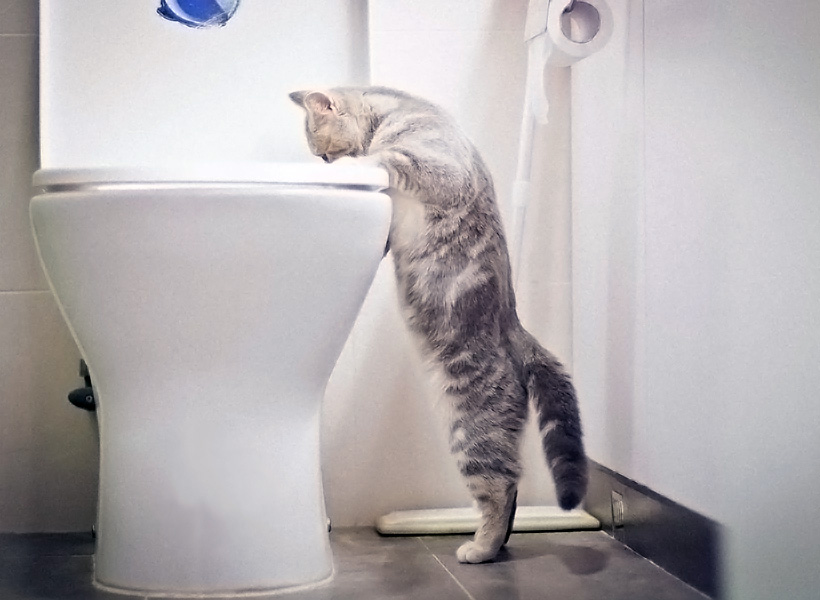Why You Should Never Flush Cat Poop Down Your Toilet - Important Facts
Why You Should Never Flush Cat Poop Down Your Toilet - Important Facts
Blog Article
This post listed below relating to Can You Flush Cat Poo or Litter Down the Toilet? is incredibly motivating. Read on and make your own results.

Intro
As cat owners, it's necessary to bear in mind exactly how we get rid of our feline good friends' waste. While it might appear convenient to flush pet cat poop down the toilet, this technique can have destructive consequences for both the setting and human health and wellness.
Ecological Impact
Purging pet cat poop introduces harmful virus and parasites into the supply of water, positioning a considerable risk to aquatic ecosystems. These contaminants can adversely affect marine life and concession water high quality.
Health and wellness Risks
In addition to ecological issues, purging feline waste can also posture health and wellness risks to humans. Pet cat feces may contain Toxoplasma gondii, a bloodsucker that can cause toxoplasmosis-- a potentially extreme health problem, particularly for expecting females and individuals with damaged body immune systems.
Alternatives to Flushing
Thankfully, there are safer and a lot more liable means to dispose of cat poop. Think about the complying with options:
1. Scoop and Dispose in Trash
The most typical technique of taking care of pet cat poop is to scoop it right into an eco-friendly bag and toss it in the trash. Be sure to use a dedicated clutter inside story and throw away the waste immediately.
2. Use Biodegradable Litter
Opt for eco-friendly feline clutter made from materials such as corn or wheat. These trashes are eco-friendly and can be securely gotten rid of in the garbage.
3. Bury in the Yard
If you have a backyard, consider burying pet cat waste in an assigned area away from veggie gardens and water sources. Make certain to dig deep adequate to prevent contamination of groundwater.
4. Set Up a Pet Waste Disposal System
Purchase a pet waste disposal system particularly created for feline waste. These systems use enzymes to break down the waste, reducing odor and environmental impact.
Final thought
Liable pet ownership prolongs past providing food and shelter-- it likewise includes correct waste monitoring. By refraining from flushing cat poop down the toilet and choosing alternate disposal techniques, we can lessen our ecological footprint and protect human health.
Why You Should Never Flush Cat Poop Down the Toilet
A rose by any other name might smell as sweet, but not all poop is created equal. Toilets, and our sewage systems, are designed for human excrement, not animal waste. It might seem like it couldn’t hurt to toss cat feces into the loo, but it’s not a good idea to flush cat poop in the toilet.
First and foremost, assuming your cat uses a litter box, any waste is going to have litter on it. And even the smallest amount of litter can wreak havoc on plumbing.
Over time, small amounts build up, filling up your septic system. Most litter sold today is clumping; it is made from a type of clay that hardens when it gets wet. Ever tried to scrape old clumps from the bottom of a litter box? You know just how cement-hard it can get!
Now imagine just a small clump of that stuck in your pipes. A simple de-clogger like Drano isn’t going to cut it. And that means it’s going to cost you big time to fix it.
Parasitic Contamination
Believe it or not, your healthy kitty may be harboring a nasty parasite. Only cats excrete Toxoplasma in their feces. Yet it rarely causes serious health issues in the cats that are infected. Most people will be fine too if infected. Only pregnant women and people with compromised immune systems are at risk. (If you’ve ever heard how women who are expecting are excused from litter cleaning duty, Toxoplasma is why.)
But other animals may have a problem if infected with the parasite. And human water treatment systems aren’t designed to handle it. As a result, the systems don’t remove the parasite before discharging wastewater into local waterways. Fish, shellfish, and other marine life — otters in particular — are susceptible to toxoplasma. If exposed, most will end up with brain damage and many will die.
Depending on the species of fish, they may end up on someone’s fish hook and, ultimately on someone’s dinner plate. If that someone has a chronic illness, they’re at risk.
Skip the Toilet Training
We know there are folks out there who like to toilet train their cats. And we give them props, it takes a lot of work. But thanks to the toxoplasma, it’s not a good idea.

We are very intrigued by How to Dispose of Cat Poop and Litter Without Plastic Bags and I hope you enjoyed reading the new blog entry. Appreciated our blog posting? Please share it. Let someone else locate it. Kudos for your time. Kindly check up our blog back soon.
This Page Report this page